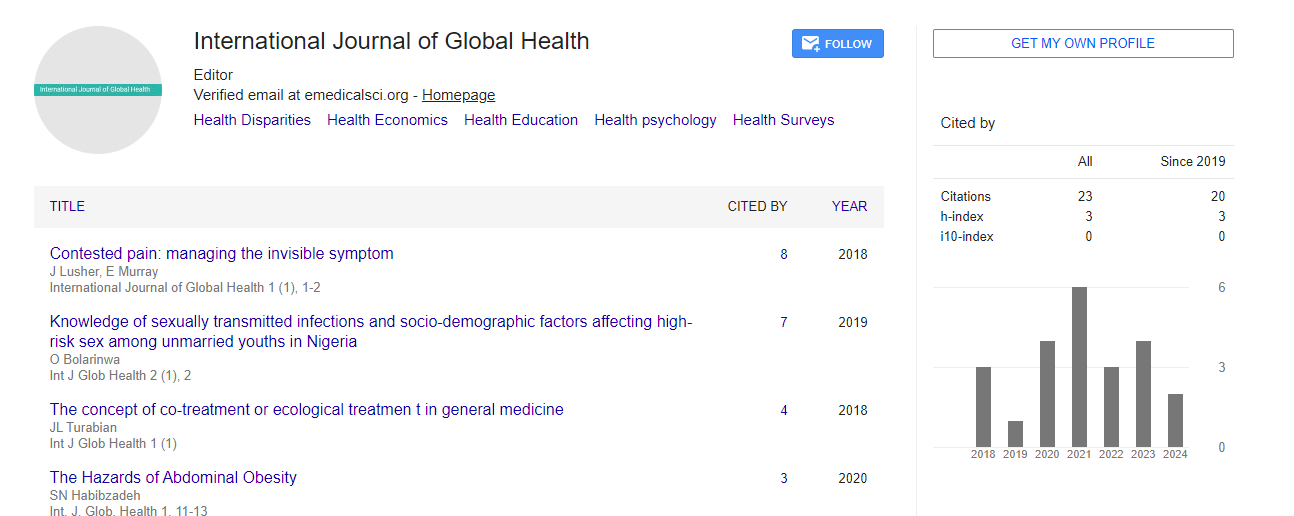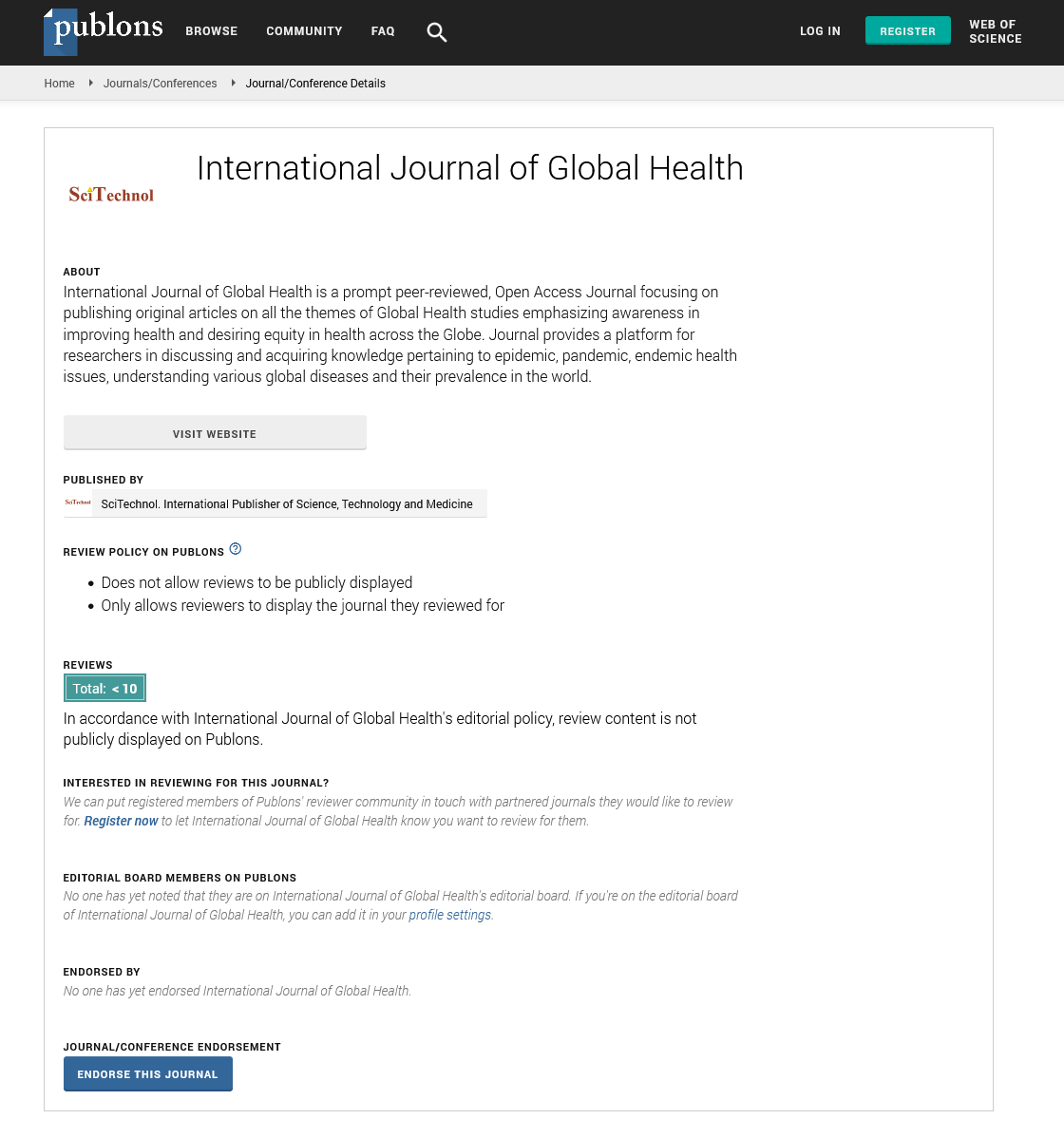Commentary, Int J Glob Health Vol: 7 Issue: 3
Promoting Health Equity: Addressing Disparities in Women's Health
Bart Geerling*
1Department of Gynaecology, University of Alberta, Alberta, Canada
*Corresponding Author: Bart Geerling,
Department of Gynaecology, University of
Alberta, Alberta, Canada
E-mail: bart.ge@ua.ca
Received date: 26 August, 2024, Manuscript No. IJGH-24-148992;
Editor assigned date: 28 August, 2024, PreQC No. IJGH-24-148992 (PQ);
Reviewed date: 11 September, 2024, QC No. IJGH-24-148992;
Revised date: 19 September, 2024, Manuscript No. IJGH-24-148992 (R);
Published date: 25 September, 2024, DOI: 10.4172/Ijgh.1000211.
Citation: Geerling B (2024) Promoting Health Equity: Addressing Disparities in Women's Health. Int J Glob Health 7:3.
Abstract
Description
Women's health encompasses a broad range of issues that are unique to women, including reproductive health, hormonal health, chronic conditions, and mental health. Historically, medical research has often overlooked the specific health needs of women, leading to gaps in understanding and treatment. This manuscript provides an overview of key aspects of women’s health, emphasizing the importance of genderspecific approaches to healthcare and highlighting significant health issues faced by women throughout their lives. Menstrual health is a critical component of reproductive health. Regular menstrual cycles are an indicator of overall health, but many women experience disorders such as dysmenorrhea (painful periods), amenorrhea (absence of menstruation), and polycystic ovary syndrome (PCOS). Addressing menstrual health involves understanding these conditions, promoting menstrual hygiene and providing access to necessary treatments and support.
Access to contraception is essential for women's autonomy and health. Various contraceptive methods are available, including hormonal (pills, patches injections) and non-hormonal options (IUDs condoms). Family planning services should offer comprehensive education on contraceptive choices, benefits, risks and access to healthcare providers to ensure informed decision-making. Maternal health is critical for the well-being of both mothers and their children. Comprehensive prenatal care is essential for monitoring the health of the mother and fetus, managing risks, and addressing complications such as gestational diabetes and preeclampsia. Postpartum care is equally important, focusing on physical recovery, mental health and the establishment of healthy practices for infant care. Menopause is a natural biological process marking the end of a woman’s reproductive years. It typically occurs between the ages of 45 to 55 and is accompanied by hormonal changes that can lead to symptoms such as hot flashes, night sweats, mood swings, and vaginal dryness. Hormone replacement therapy (HRT) may be considered for symptom relief, but the risks and benefits must be carefully evaluated with healthcare providers.
Chronic health conditions
Cardiovascular health: Cardiovascular disease (CVD) is a leading cause of death among women, often presenting differently than in men. Risk factors include hypertension, diabetes, obesity and lifestyle choices. Regular screenings, education on risk factors and promotion of heart-healthy habits (such as diet and exercise) are vital for prevention and early detection.
Bone health: Women are at higher risk for osteoporosis, especially post-menopause due to the decline in estrogen levels. Preventive measures include adequate calcium and vitamin D intake, regular weight-bearing exercise and lifestyle modifications such as smoking cessation. Bone density screenings are recommended for women at risk to monitor bone health and prevent fractures.
Mental health: Mental health issues, including depression and anxiety, are prevalent among women and can be worsen by hormonal changes throughout life, such as during puberty, pregnancy, and menopause. Access to mental health services, therapy and support systems is essential for women’s overall well-being. Reducing stigma and promoting awareness about mental health are essential for encouraging women to seek help.
Promoting a healthy lifestyle is fundamental in preventing chronic diseases. Key components includes a balanced diet rich in fruits, vegetables, whole grains and lean proteins supports overall health. Special attention should be paid to calcium and iron intake. Regular exercise, at least 150 minutes of moderate aerobic activity per week, is essential for maintaining a healthy weight, improving cardiovascular health and enhancing mental well-being. Smoking cessation and moderation of alcohol intake are essential for reducing the risk of various health conditions. Women from diverse backgrounds may face unique health challenges due to socioeconomic factors, access to care, and cultural beliefs. It is essential to address health disparities by ensuring that women have access to affordable and quality healthcare services is fundamental in promoting health equity. Healthcare providers should be trained to understand and respect cultural differences in health beliefs and practices, promoting an inclusive environment for all women. Public health initiatives should focus on educating women about their health needs, available resources and preventive care.
Conclusion
Women’s health is a multifaceted field requiring a comprehensive and tailored approach to address the unique needs of women throughout their lives. By emphasizing reproductive health, chronic condition management, preventive care and addressing health disparities, we can improve health outcomes for women. It is vital for healthcare providers to advocate for women’s health, promote awareness, and ensure access to essential services. Continued research and education are vital in advancing women’s health and well-being.
 Spanish
Spanish  Chinese
Chinese  Russian
Russian  German
German  French
French  Japanese
Japanese  Portuguese
Portuguese  Hindi
Hindi 
